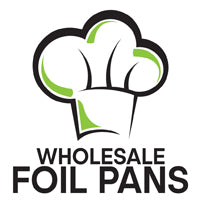In today's world, consumers are increasingly conscious of the environmental impact of their choices. As a food business, embracing sustainability isn't just a trend—it's a necessity. One effective way to reduce your business's environmental footprint is by incorporating eco-friendly disposable products. Not only does this decision help protect the planet, but it can also enhance your brand image, attract eco-conscious customers, and even save you money in the long run.
Shop All Our Eco-Friendly Take Out Containers
Benefits of Using Eco-Friendly Disposables
1. Reducing Environmental Impact
Traditional disposable products like plastic cutlery, cups, and packaging can take hundreds of years to decompose, contributing to landfills and ocean pollution. In contrast, eco-friendly disposables, often made from materials like recycled paper, cornstarch, and bamboo, decompose faster and leave behind fewer toxins. By switching to these alternatives, you help minimize your contribution to plastic waste and environmental degradation.
Earth Smart™ 8″ Round White Pulp Bowl, 32 oz.
2. Enhancing Brand Reputation
Consumers today are more likely to support businesses that align with their values, especially when it comes to sustainability. By adopting eco-friendly disposables, you're showing your commitment to the environment, which can improve your brand image and customer loyalty. You might even gain free marketing, as customers are often eager to share their positive experiences with green businesses.
3. Complying with Regulations
Many regions are enacting stricter regulations regarding single-use plastics. By making the shift to sustainable options now, you can stay ahead of these changes and avoid potential fines or disruptions to your business operations.
8 x 8 x 3 MFPP 1 Compartment Hinged Take Out Container
How to Transition to Sustainable Options
Transitioning to eco-friendly disposables may seem daunting, but it doesn’t have to be costly or complicated. Here are some tips to make the switch smooth and efficient:
1. Start Small
You don’t have to overhaul your entire operation overnight. Begin by replacing a few key items, such as plastic straws or Styrofoam containers, with more sustainable options. Gradual changes can help you manage costs and allow your customers to adjust to the new materials.
2. Source Reputable Suppliers
Look for suppliers that specialize in eco-friendly disposables and offer competitive pricing. Many suppliers provide bulk discounts, helping you keep costs manageable.
Safe-T-Fresh® Tamper Evident 24 oz. Deli Container
3. Prioritize Quality
One concern business owners often have is whether eco-friendly disposables can match the quality of traditional options. The good news is that sustainable products have come a long way. Look for options made from durable materials like bamboo or sugarcane, which are sturdy and offer a high-quality experience for your customers.
4. Educate Your Customers
When introducing new eco-friendly disposables, let your customers know why you’re making the change. Use signage, social media, or even direct conversations to explain the benefits of these products. By raising awareness, you'll likely receive positive feedback from customers who share your environmental values.
5. Monitor Costs and Savings
While eco-friendly disposables can sometimes come with a higher upfront cost, they can lead to long-term savings. For instance, switching to durable, reusable options for in-house dining can cut down on your need for disposables altogether. Additionally, attracting more eco-conscious customers can increase your sales and offset any initial cost differences.
Conclusion
Transitioning to eco-friendly disposable products is not only beneficial for the environment but also for your food business. By reducing your environmental footprint, enhancing your brand reputation, and staying ahead of regulatory changes, you position your business for long-term success. Start with small changes, source high-quality products, and educate your customers along the way. Your efforts toward sustainability will not go unnoticed—and your business will thrive because of it.






